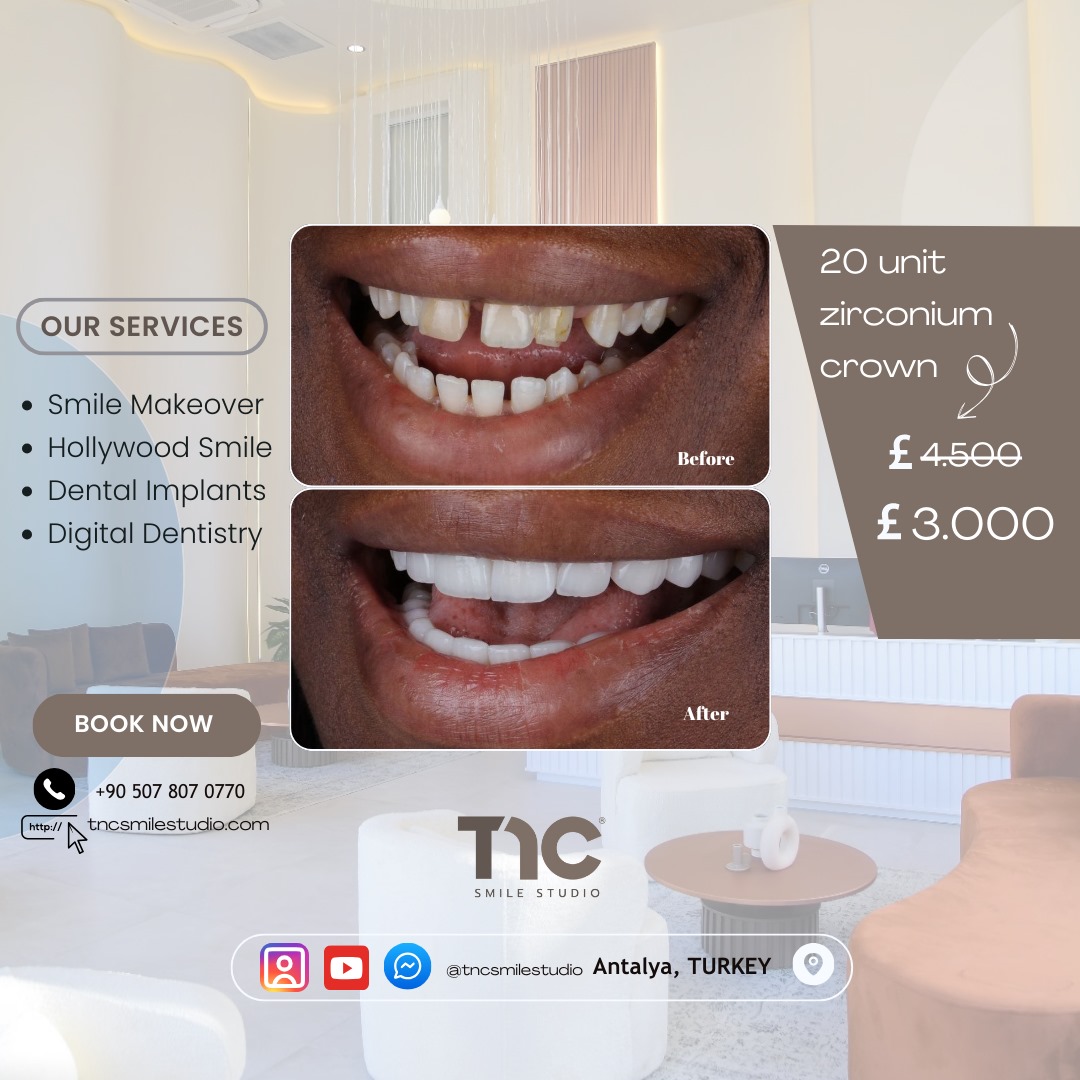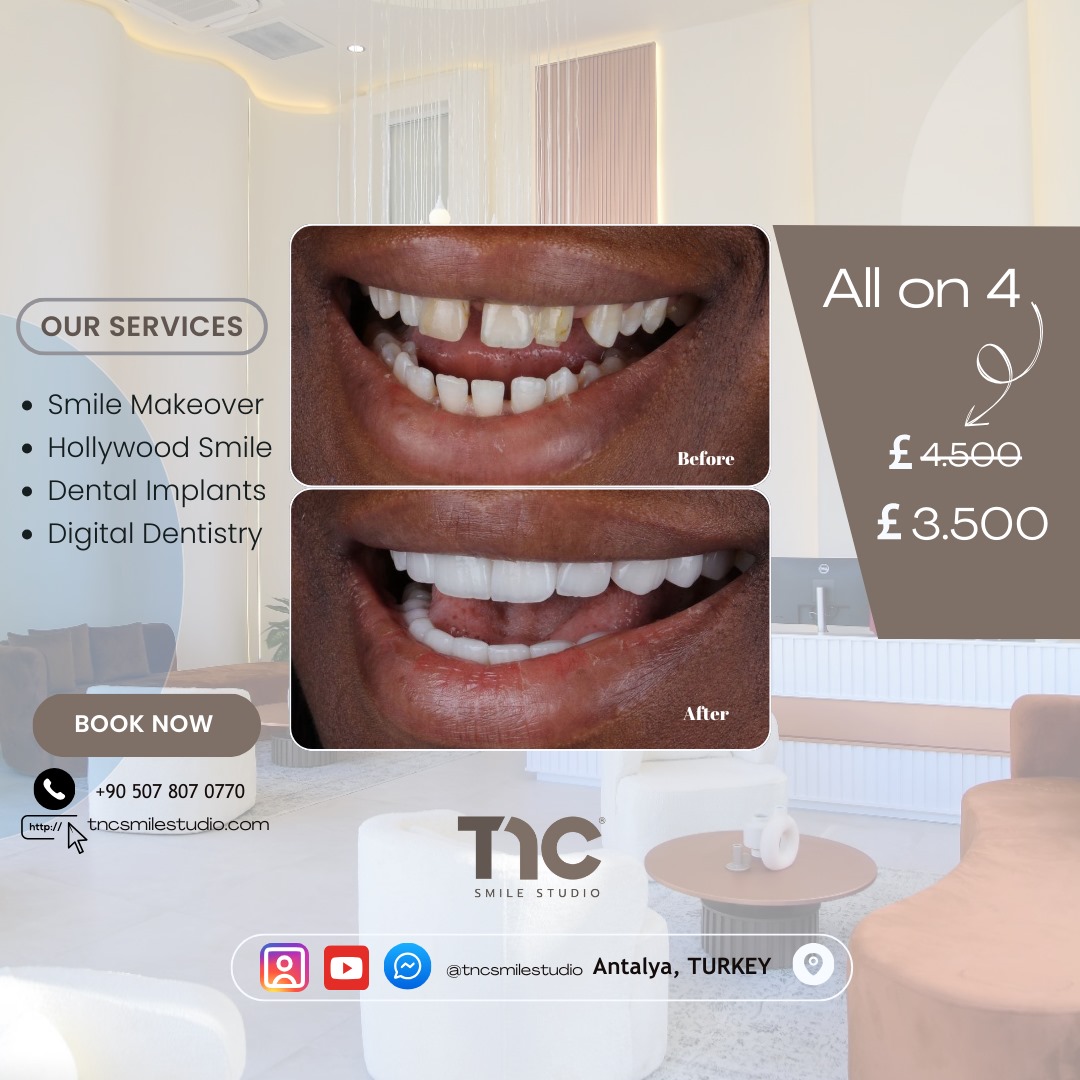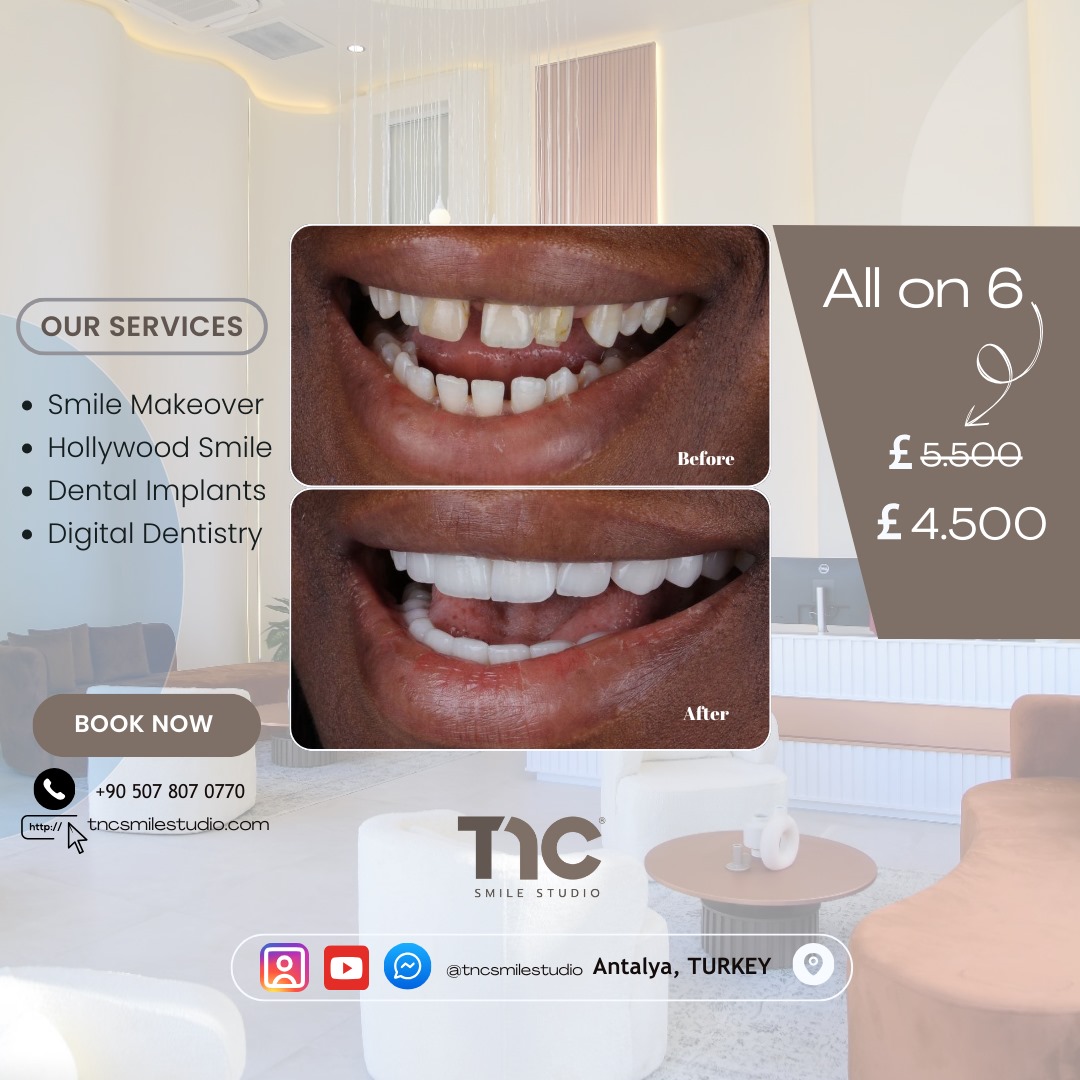Get information about dental implant treatment with the detailed explanation of specialist dentist Seher Arseven.
Dental Implants

Dental Implants Turkey, Antalya.
Your smile is the key to your confidence. Missing teeth can tarnish that key. Fortunately, modern dentistry has made it much easier and more aesthetic to replace missing teeth. You can explore below what implant treatment is, how it is performed, its advantages, and more, allowing you to bid farewell to your missing teeth and regain your confident smile.
What is Implant Treatment?
Implant treatment is a method where screws (implants) made of titanium are placed into the jawbone to replace missing teeth, and prosthetics are then placed on top of these implants. This provides a result that is as close to natural teeth as possible in terms of both aesthetics and functionality.
How is Implant Treatment Performed?
Implant treatment is a precise and meticulous process for replacing missing teeth. The process can vary based on the individual’s needs and jawbone structure. Generally, implant treatment involves the following steps:
- Evaluation and Planning: The first step is for your dentist to conduct a detailed examination and evaluate your jawbone structure using imaging methods such as X-rays. Based on this evaluation, the number, size, and placement of the implants are determined.
- Implant Placement: Under local anesthesia, a small incision is made in the area where the implant will be placed in the jawbone. The implant is then inserted into the jawbone with special tools and the area is closed with stitches.
- Healing and Osseointegration: A specific period is required for the implant to integrate with the jawbone. This period can range from 3 to 6 months. During this time, it is important to follow your dentist’s recommendations to speed up healing and reduce the risk of infection.
- Abutment Placement: Once the implant has fully integrated with the jawbone, a second minor surgical procedure is performed to place a piece called an abutment on the implant. The abutment acts as a connection for the prosthetic.
- Prosthetic Measurement and Preparation: After the abutment is placed, your dentist takes measurements for the prosthetic, which is then custom-made in a lab. This process can take a few weeks.
- Prosthetic Placement: Once the prosthetic is ready, your dentist places it on the abutment and makes any necessary adjustments. This completes the implant treatment, allowing you to smile confidently with your new teeth.
Implant treatment, when planned correctly and performed by a skilled dentist, is a very successful and safe method. Staying in communication with your dentist and following their recommendations throughout the treatment process is crucial for achieving a successful outcome.
Advantages of Implant Treatment
Implant treatment is considered one of the most effective and modern solutions for replacing missing teeth. It has many advantages over other treatment methods:
Functional Advantages
- Natural Tooth Feel: Implants provide a feeling closest to natural teeth by integrating with the jawbone. This allows you to speak, smile, and eat comfortably.
- Improved Chewing Function: Implants transmit the chewing force directly to the jawbone, similar to natural teeth. This means you can chew without any restrictions.
- Eliminates Speech Problems: Missing teeth can cause difficulties in pronouncing certain letters. Implants eliminate these problems, improving your speech quality.
- Preserves Jawbone: Implants stimulate the jawbone, preventing bone loss and helping to maintain the jaw structure.
Aesthetic Advantages:
- Natural Appearance: Implants and the prosthetics placed on them are designed to match your natural teeth. This gives you an aesthetically pleasing smile.
- Supports Facial Structure: Missing teeth can cause facial collapse over time. Implants prevent this, keeping your face looking younger and fuller.
- Boosts Confidence: With your new teeth, you can smile, speak, and socialize more comfortably. This increases your confidence and enhances your quality of life.
Due to its many advantages, implant treatment is one of the most preferred methods for replacing missing teeth.
Dental Implant Prices Turkey in 2024
The cost of implant treatment varies depending on several factors. These include:
- Implant Brand and Quality: Implants are produced by different brands, each with unique features and prices. Domestic implants are more affordable, while imported implants can be more expensive.
- Number of Implants: The number of implants required depends on the number of missing teeth. A single implant suffices for one missing tooth, while multiple implants are needed for multiple missing teeth. The cost increases with the number of implants.
- Type of Prosthetic: Different types of prosthetics can be placed on implants, such as metal-supported porcelains, zirconium porcelains, or all-ceramic prosthetics. The type of prosthetic affects the cost of the implant treatment.
- Need for Bone Grafting: In some cases, bone grafting (adding bone powder) is required to strengthen the jawbone before placing the implant. This additional procedure increases the cost.
- Dentist’s Experience and Expertise: Implant treatment requires expertise. Treatments performed by experienced and specialized dentists yield more successful results, but the cost may be higher.
- Additional Treatments: Additional treatments such as gum treatment or root canal therapy may be needed in conjunction with implant treatment, affecting the total cost.
As of 2024, the price of implants in Turkey ranges from approximately 350 to 15,000$. Prices can increase further depending on the type of prosthetic. For precise information on implant treatment costs, it is recommended to have a detailed consultation with your dentist and develop a personalized treatment plan.
Who Can Get Implants?
While implant treatment is an effective solution for replacing missing teeth, it may not be suitable for everyone. Suitability for implant treatment depends on factors such as general health, jawbone structure, and lifestyle. Suitable candidates for implant treatment include:
- Individuals with Completed Jawbone Development: Implants integrate with the jawbone. Therefore, individuals who have completed their jawbone development, typically over the age of 18, are suitable for implant treatment.
- Those in Good General Health: Certain health conditions, such as uncontrolled diabetes, heart diseases, or immune system issues, can negatively affect the success of implant treatment. Thus, individuals in good general health are better candidates.
- Those with Adequate Bone Volume: Sufficient bone volume is necessary for implant placement. In cases of bone loss, bone grafting may be required before implant placement.
- Individuals without Gum Disease: Healthy gums are crucial for the longevity of implants. Those with gum disease need to have this treated before receiving implants.
Who Cannot Get Implants?
Implant treatment may not be suitable or may require careful consideration in the following situations:
- Diabetes: Uncontrolled diabetes can adversely affect the healing process, increasing the risk of infection and hindering the integration of the implant with the bone.
- Heart Diseases: Implant surgery poses additional risks for individuals with heart disease. Such individuals should consult with a cardiologist before undergoing implant treatment.
- Immune System Disorders: Those with weakened immune systems have a higher risk of infection and a greater chance of implant rejection.
- Severe Osteoporosis: Advanced bone loss can make the jawbone insufficient to support the implant, increasing the risk of implant failure.
- Bruxism (Teeth Grinding): Teeth grinding places excessive stress on implants, potentially shortening their lifespan or causing failure.
- Certain Medications: Chemotherapy drugs, corticosteroids, and some rheumatoid medications can negatively impact the success of implant treatment.
- Pregnancy and Breastfeeding: Implant treatment is generally postponed during pregnancy and breastfeeding. However, in some cases, implants may be placed if deemed appropriate by the dentist.
This list does not cover all conditions that may preclude implant treatment. Since each individual’s situation is unique, it is essential to have a detailed consultation with your dentist and undergo necessary examinations before implant treatment.
How Long Does Implant Treatment Take?
The duration of implant treatment varies based on several factors, including the number of implants, the patient’s healing rate, the need for bone grafting, and the treatment plan. The total duration of implant treatment can range from 3 to 9 months.
In some cases, methods such as “accelerated implant treatment” or “same-day implants” can shorten the treatment time. However, these methods are not suitable for everyone and require specific conditions.
Healing Process
The healing process after implant treatment is crucial for the success of the treatment and the long-term durability of the implant. This process involves the integration of the implant with the jawbone (osseointegration) and the healing of surrounding tissues.
- First 24 Hours: Mild pain, swelling, and bruising around the implant area are normal and should subside within a few days. It is important to use the pain relievers and antibiotics recommended by your dentist. Avoid hot foods and beverages and apply cold compresses during the first 24 hours.
- First Week: Stitches, if present, are usually removed 7-10 days after the procedure. Continue consuming soft foods and avoid putting pressure on the implant area. Maintaining oral hygiene is crucial for the health of the tissues around the implant. Brush your teeth and use mouthwash as recommended by your dentist.
- First Month: Swelling and sensitivity around the implant area decrease. Gradually return to your normal diet but continue avoiding hard and sticky foods.
- After 6 Months: The implant treatment is completed and permanent prosthetics are placed. You can return to your normal diet and confidently smile with your new teeth. To ensure the long-term use of your implants, continue regular dental check-ups and maintain good oral hygiene.
Implant Lifespan
With proper care and regular check-ups, implants can last a lifetime. However, the average lifespan of implants can vary depending on several factors. The average lifespan of implants can be 15-25 years or longer.
Implant Brands
The implant brands used by TNC Smile Studio.

Meisinger is recognized for its pioneering implant solutions and thorough clinical research, committed to delivering outstanding patient outcomes.

Neodent provides advanced dental implant systems focused on long-lasting durability and natural aesthetics, supported by comprehensive scientific research.

Straumann is recognized for its pioneering implant solutions and extensive clinical research, dedicated to achieving exceptional patient outcomes.
Dr.Dt. Seher ARSEVEN
She graduated from Hacettepe University Faculty of Dentistry in 2016. Between 2016 and 2018, she worked at Liv Hospital. After completing a six-year training program at Gazi University Faculty of Dentistry, Department of Periodontology, she obtained her PhD. She specializes in aesthetic gingival surgeries, the treatment of gingival recessions, and gingival diseases, with her thesis focusing on peri-implantitis and implant surgeries. She has numerous national and international publications related to peri-implantitis and implant treatments. Additionally, she is skilled in advanced bone surgeries.

Before & After Photos
Packages

TNC Smile VIP Transfer Service
TNC Smile offers VIP transfer for international patients. We provide airport pick-up and private transport to the polyclinic and hotel, ensuring a smooth, comfortable experience throughout their stay.
TNC Smile 5-Star Accommodation
TNC Smile ensures a luxurious stay for our international patients by arranging accommodations at top-rated 5-star hotels. With comfort and convenience in mind, we offer the finest hospitality for a seamless experience throughout their treatment journey.















